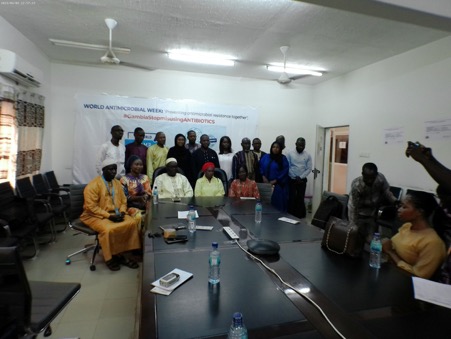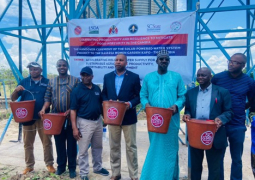
According to World Health Organisation, AMR week is a global campaign to raise awareness and understanding of AMR and promote best practices among health stakeholders to reduce the emergence and spread of drug-resistant infections. Thus, the theme for this year’s event is – ‘Preventing Antimicrobial Resistance Together’.
The event is celebrated from 18-24 November yearly, but due to logistics issues, The Gambia couldn’t celebrate the event as planned last November, 2023.
At the presser held at the Central Medical Store in Kotu, Haruna S. Jallow, principal laboratory Scientist, at the Ministry, explained that AMR is on the rise globally amid misuse of medication especially in developing countries.
This, he added, has resulted to the resistance of the virus, where these antibiotics that are supposed to stop the growth of microbials are getting now resistant to the drugs.
“In The Gambia, we have been doing a lot in terms of tackling AMR both in laboratory site and awareness stage.”
Jallow also spoke about their plan of activities with regard to tackling AMR which includes nationwide awareness forums, saying they also want to establish AMR functional data and lab-based surveillance so as to see whether their activities are paying dividend or not.
For his part, Babanding Sabally, deputy permanent secretary at the Ministry of Health, reminded that annually, Word Health Organisation and partners set aside a week to celebrate Antimicrobial Week.
He revealed that Antimicrobial Resistance (AMR) occurs when bacteria, viruses, fungi and parasites no longer respond to antimicrobial agents, adding that as a result of drug resistance, antibiotics and other antimicrobial agents become ineffective and infections become difficult or impossible to treat, increasing the risk of disease spread, severe illness and death.
“And this causes a lot of burden not only to the patients, but to the overall health system.”
DPS Sabally noted that the disease burden on the patient is that the latter probably may stay longer in the hospital to receive more treatment amid higher cost as the patient and family has to go in for another alternative which may be expensive.
He revealed that the WHO and partners put aside the week to create awareness on the use of antimicrobials agents and that the key word is they want to encourage the optimal use of these antimicrobial agents.
“Any person who intends to use the antimicrobial agents must ensure that he or she uses it for the right cause. The misuse and abuse of antimicrobial agents doesn’t only limit to human health but it also cuts across animal health and the environment.”
He reminded that in the animal industry, some of these antimicrobial agents are use as feeds, which he said, goes through food supply chain and eventually is consumed by human beings.





